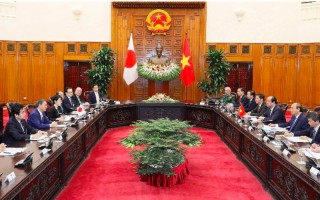Loading
Search
▼ Japan – Taking Initiative In The Asia-Pacific Region
- Category:Event
Japanese Prime Minister Yoshihide Suga embarked on his first diplomatic visits last month, meeting the Vietnamese and Indonesian governments. Suga’s choice of Vietnam and Indonesia, both important members of the Association of Southeast Asian Nations (ASEAN), demonstrates his aim to continue the policy formulated under his predecessor Shinzo Abe for a Free and Open Indo-Pacific (FOIP).
Alongside this, there are indications that Japan will step up the involvement of its defence industry both for the country’s own security and that of the wider Asia-Pacific region. With an ineffective US Asia policy and a gutted US State Department, the moment is right for Japan to take the initiative towards peace and prosperity in the region.
Room for Manoeuvre
The US State Department under the Trump administration has been hobbled; according to a report in July by the Senate Foreign Relations Committee Democratic Staff, there has been no confirmed Assistant Secretary for South and Asian Affairs under Trump, with an Assistant Secretary for East Asian and Pacific Affairs only confirmed in June of last year.
Compounding this diplomatic deficiency, the Trump administration’s overt anti-China stance has not been enthusiastically accepted by many states in the region.
Even though states like Vietnam or Indonesia have an interest in opposing China in some areas, such as island and maritime claims in the South China Sea and Chinese fishing activity, these same states recognise China’s importance for the growth of their own economies and for finding a solution to the ongoing COVID-19 pandemic. The US’ diplomatic and policy shortcomings in the region provide an opportunity for Japan to fill the gap.
Fundamentally, Suga’s foreign policy appears to be a continuation of the FOIP policy devised by his predecessor which aims to secure regional stability, economic development and rules-based conduct in the region.
Despite assertions by Suga that he will develop his own diplomatic style, it is highly likely that Shinzo Abe’s influence will continue to be felt over Japan’s foreign policy given Suga’s lack of diplomatic experience and his intent to consult with Abe on foreign policy matters.
In the short term, Suga’s foreign policy is likely to remain limited due to two factors: first, the ongoing COVID-19 pandemic is occupying the government’s attention and limits the scope for international travel. Secondly, the fact that a Lower House election has not yet been held since Suga came to power limits his administration’s flexibility and legitimacy if desiring to depart on a different policy course.
Providing Options and Alternatives
Nevertheless, there is scope for Japan to play a valuable and proactive role in the region through its FOIP policy. Japan’s policy provides an invaluable option to countries in the region, particularly the ASEAN member states.
This is because Japan’s pragmatic policy style, more so than the Trump administration’s vocally uncompromising anti-China focus in the region, permits ASEAN members to maintain ‘ASEAN centrality’ and avoid taking an explicit side within Great Power competition between China and the US. Similarly Japan, as an alternative to both China and the US for aid in the region, affords countries in the region greater leeway to play China and the US off against each other and maximise the assistance they receive.
Japan is already the largest donor of Official Development Assistance (ODA) in Asia, with a focus on infrastructure projects. This is an area where Japan increasingly faces competition from China with the likes of its Belt and Road Initiative. However, it is possible for Japan to leverage the strengths of its ODA to make a difference regionally in a way that Chinese aid has not.
For example, capitalising on Japan’s experience in natural disaster management and the more prominent position it gives to sustainable development relative to China, Japan can provide an appealing option for Southeast Asian states, many of which are vulnerable to the long term effects of climate change.
Likewise, Japanese infrastructure investments differentiate themselves from China’s large scale investments by typically being of a smaller scale, but of a higher technical quality. In this way, Japan is likely to be able to retain its relevance to the region and have a positive impact for its development.
A Defence Revival
Though, as mentioned earlier, Suga’s foreign policy is likely to largely follow that of his predecessor, there are already indications that under Suga there will be a turn towards more engagement and cooperation regarding defence agreements and exports with the region.
While during Abe’s tenure Vietnam and Japan did not transfer military platforms, during Suga’s October visit both countries signed an agreement to set the foundation for the export of Japanese defence technology to Vietnam.
Japan delivered its first defence equipment export in August; namely, the delivery of a radar system to the Philippines. Japan is in talks with Indonesia and Thailand for similar defence deals. Domestically too, Japan seems to be taking the initiative by selecting Mitsubishi Heavy Industries this month to develop the country’s first new fighter aircraft in 30 years.
Though Japan’s defence industry remains sluggish in moving towards defence exports due to business risks and the Japanese public’s anti-militarism, these indications and the changing regional security environment make it highly likely that over the course of Suga’s premiership Japan and its defence industry will gain momentum and play a more involved role in enhancing the region’s capabilities.
Conclusions
Despite the broad continuity of Japan’s foreign policy, there exists a wealth of opportunities for Japan to take a proactive role in the Asia-Pacific region given the US’ diplomatic disengagement.
By leveraging the unique strengths of its ODA and taking a more pragmatic stance that accepts Chinese development assistance in the region or even works alongside it, it is likely that Japan will be able to strengthen its influence in Southeast Asia. Correspondingly, increasing its defence exports and cooperation in the region is likely to benefit Japan’s domestic industry and improve regional stability.
- December 12, 2020
- Comment (0)
- Trackback(0)


